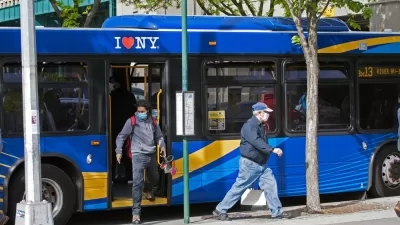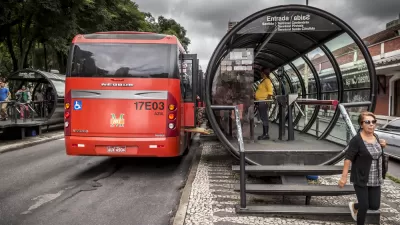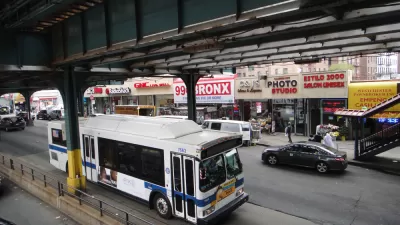It's great that the New York MTA is overhauling its fare system and doing away with the MetroCard, but there's so much more potential to realize.

Colin Wright of TransitCenter and Vincent Pellecchia and Nick Sifuentes of Tri-State Transportation Campaign have authored the "A New Way to Ride" [pdf] report to prepare for the MTA's adoption of a tap-based fare system.
"[The report] focuses on several fundamental changes advocates believe the MTA should begin discussing in advance of the phase out, including all-door bus boarding, 'fare capping' and new data collection to improve commutes," according to an article by Vincent Barone sharing the news of the new report.
The report also digs into the potential benefits of the new data the tap system will collect. As for how the new fare system is expected to work: "The slow rollout of the new technology will begin in the spring of 2019, with bank cards and smartphone payments made available at 500 station turnstiles and 600 buses," according to Barone. "The system will be available citywide by September 2020."
In addition to a pdf version of the report posted online, the TransitCenter website has a post introducing the recommendations detailed in the report. The TransitCenter team has also produced the following nifty animation to explain the concept of fare capping.
FULL STORY: MTA must prepare now for next-generation tech implementation, report says

Trump Administration Could Effectively End Housing Voucher Program
Federal officials are eyeing major cuts to the Section 8 program that helps millions of low-income households pay rent.

Planetizen Federal Action Tracker
A weekly monitor of how Trump’s orders and actions are impacting planners and planning in America.

Ken Jennings Launches Transit Web Series
The Jeopardy champ wants you to ride public transit.

Rebuilding Smarter: How LA County Is Guiding Fire-Ravaged Communities Toward Resilience
Los Angeles County is leading a coordinated effort to help fire-impacted communities rebuild with resilience by providing recovery resources, promoting fire-wise design, and aligning reconstruction with broader sustainability and climate goals.

When Borders Blur: Regional Collaboration in Action
As regional challenges outgrow city boundaries, “When Borders Blur” explores how cross-jurisdictional collaboration can drive smarter, more resilient urban planning, sharing real-world lessons from thriving partnerships across North America.

Philadelphia Is Expanding its Network of Roundabouts
Roundabouts are widely shown to decrease traffic speed, reduce congestion, and improve efficiency.
Urban Design for Planners 1: Software Tools
This six-course series explores essential urban design concepts using open source software and equips planners with the tools they need to participate fully in the urban design process.
Planning for Universal Design
Learn the tools for implementing Universal Design in planning regulations.
Ada County Highway District
Clanton & Associates, Inc.
Jessamine County Fiscal Court
Institute for Housing and Urban Development Studies (IHS)
City of Grandview
Harvard GSD Executive Education
Toledo-Lucas County Plan Commissions
Salt Lake City
NYU Wagner Graduate School of Public Service





























